Case Study: Legal Aspects of Nissan Motor Mfg. Corp. v. United States
VerifiedAdded on 2020/05/28
|9
|2269
|163
Case Study
AI Summary
This case study analyzes the legal arguments and court's decision in the case of Nissan Motor Mfg. Corp., U.S.A. v. United States, focusing on the interpretation of the Foreign Trade Zones Act (FTZA) of the United States. The case involved a dispute over the import duties assessed by the U.S. Customs Service on machinery imported by Nissan into a foreign trade zone for car manufacturing. The defendant argued that the machinery was subject to duties, while Nissan contested this, leading to cross motions for summary judgment. The analysis covers the arguments presented by the defendant, emphasizing the legislative history and the exhaustive list of activities in the FTZA, along with court's decision that capital equipment and production machinery were dutiable based on the language and history of the FTZA. The conclusion reaffirms that production and capital equipment imported into foreign trade subzones are subject to duty.
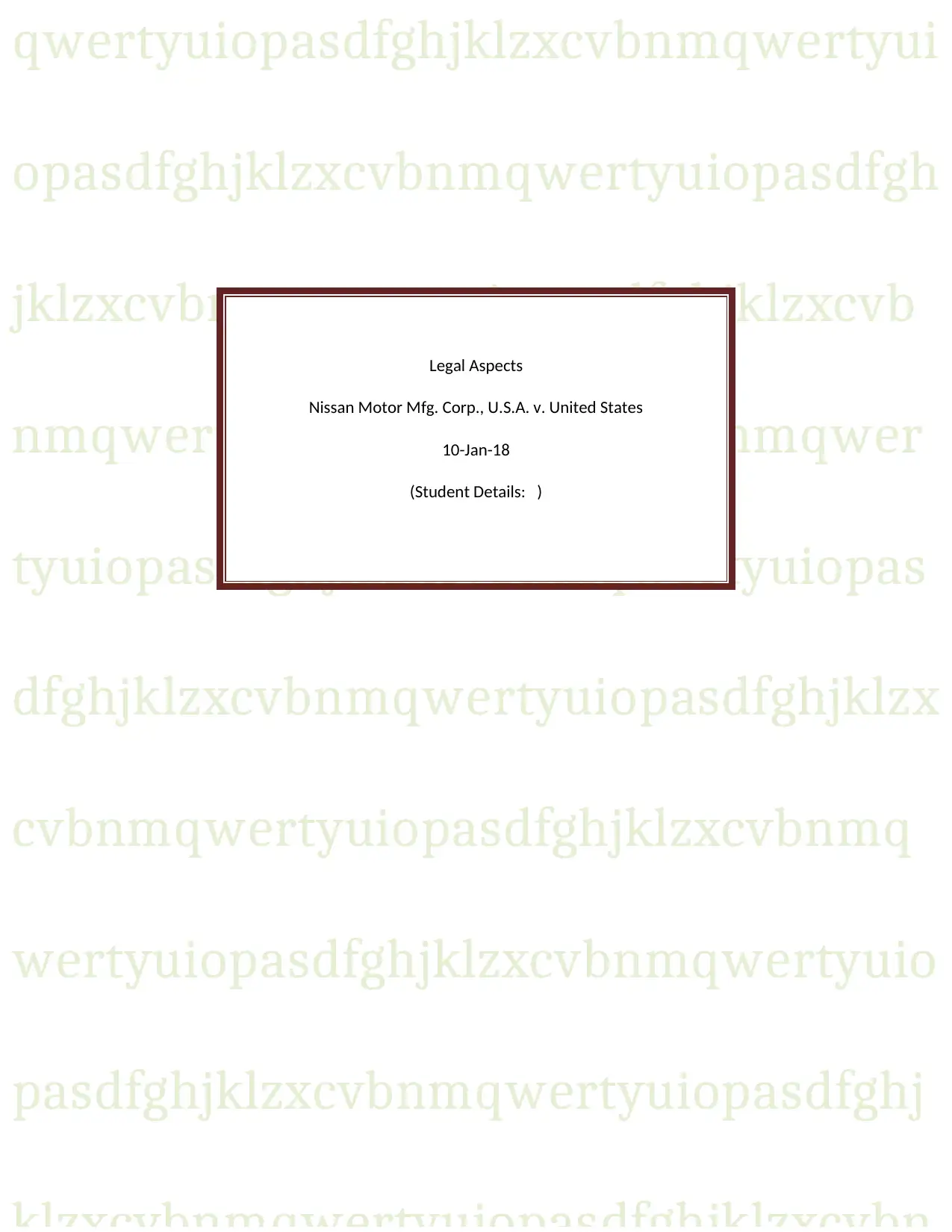
qwertyuiopasdfghjklzxcvbnmqwertyui
opasdfghjklzxcvbnmqwertyuiopasdfgh
jklzxcvbnmqwertyuiopasdfghjklzxcvb
nmqwertyuiopasdfghjklzxcvbnmqwer
tyuiopasdfghjklzxcvbnmqwertyuiopas
dfghjklzxcvbnmqwertyuiopasdfghjklzx
cvbnmqwertyuiopasdfghjklzxcvbnmq
wertyuiopasdfghjklzxcvbnmqwertyuio
pasdfghjklzxcvbnmqwertyuiopasdfghj
Legal Aspects
Nissan Motor Mfg. Corp., U.S.A. v. United States
10-Jan-18
(Student Details: )
opasdfghjklzxcvbnmqwertyuiopasdfgh
jklzxcvbnmqwertyuiopasdfghjklzxcvb
nmqwertyuiopasdfghjklzxcvbnmqwer
tyuiopasdfghjklzxcvbnmqwertyuiopas
dfghjklzxcvbnmqwertyuiopasdfghjklzx
cvbnmqwertyuiopasdfghjklzxcvbnmq
wertyuiopasdfghjklzxcvbnmqwertyuio
pasdfghjklzxcvbnmqwertyuiopasdfghj
Legal Aspects
Nissan Motor Mfg. Corp., U.S.A. v. United States
10-Jan-18
(Student Details: )
Paraphrase This Document
Need a fresh take? Get an instant paraphrase of this document with our AI Paraphraser
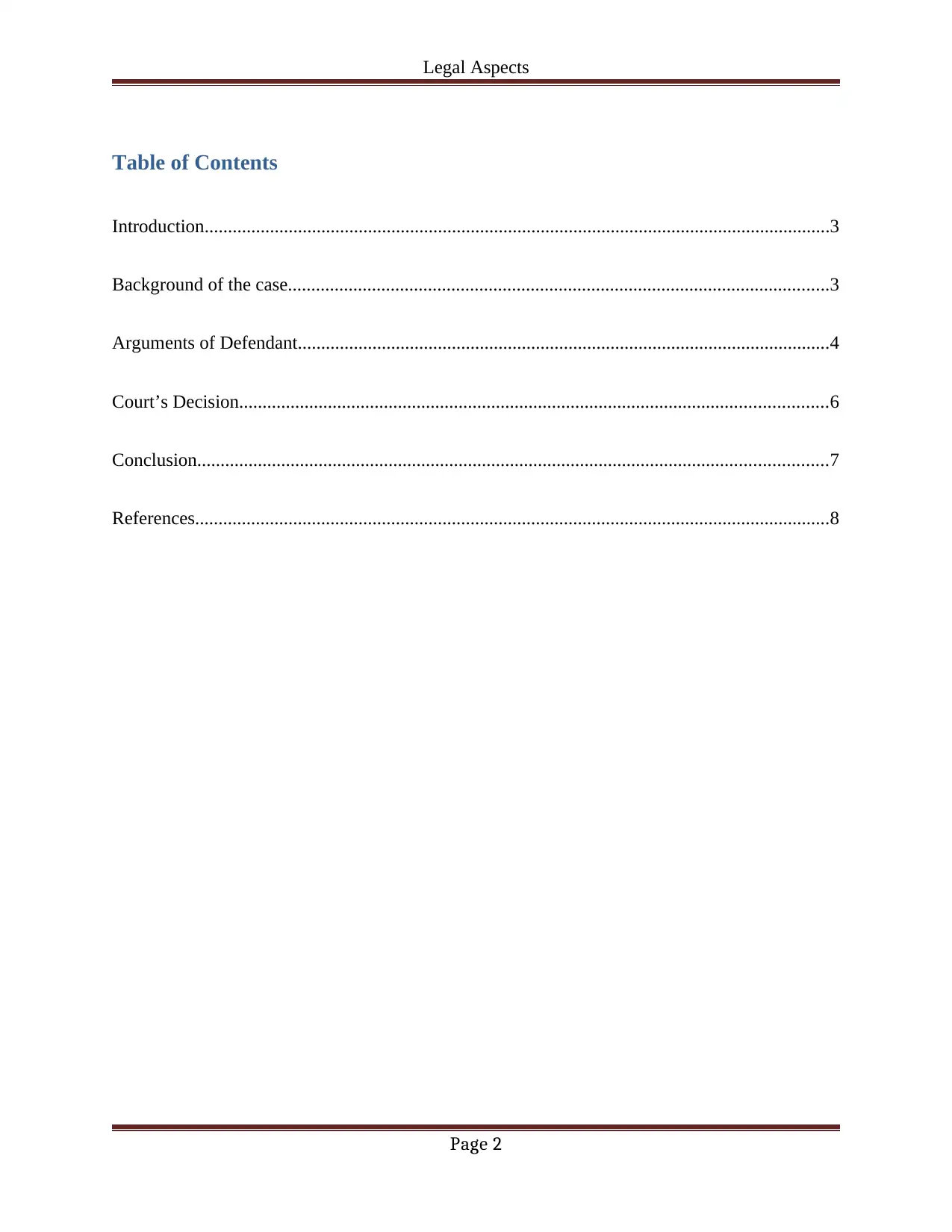
Legal Aspects
Table of Contents
Introduction......................................................................................................................................3
Background of the case....................................................................................................................3
Arguments of Defendant..................................................................................................................4
Court’s Decision..............................................................................................................................6
Conclusion.......................................................................................................................................7
References........................................................................................................................................8
Page 2
Table of Contents
Introduction......................................................................................................................................3
Background of the case....................................................................................................................3
Arguments of Defendant..................................................................................................................4
Court’s Decision..............................................................................................................................6
Conclusion.......................................................................................................................................7
References........................................................................................................................................8
Page 2
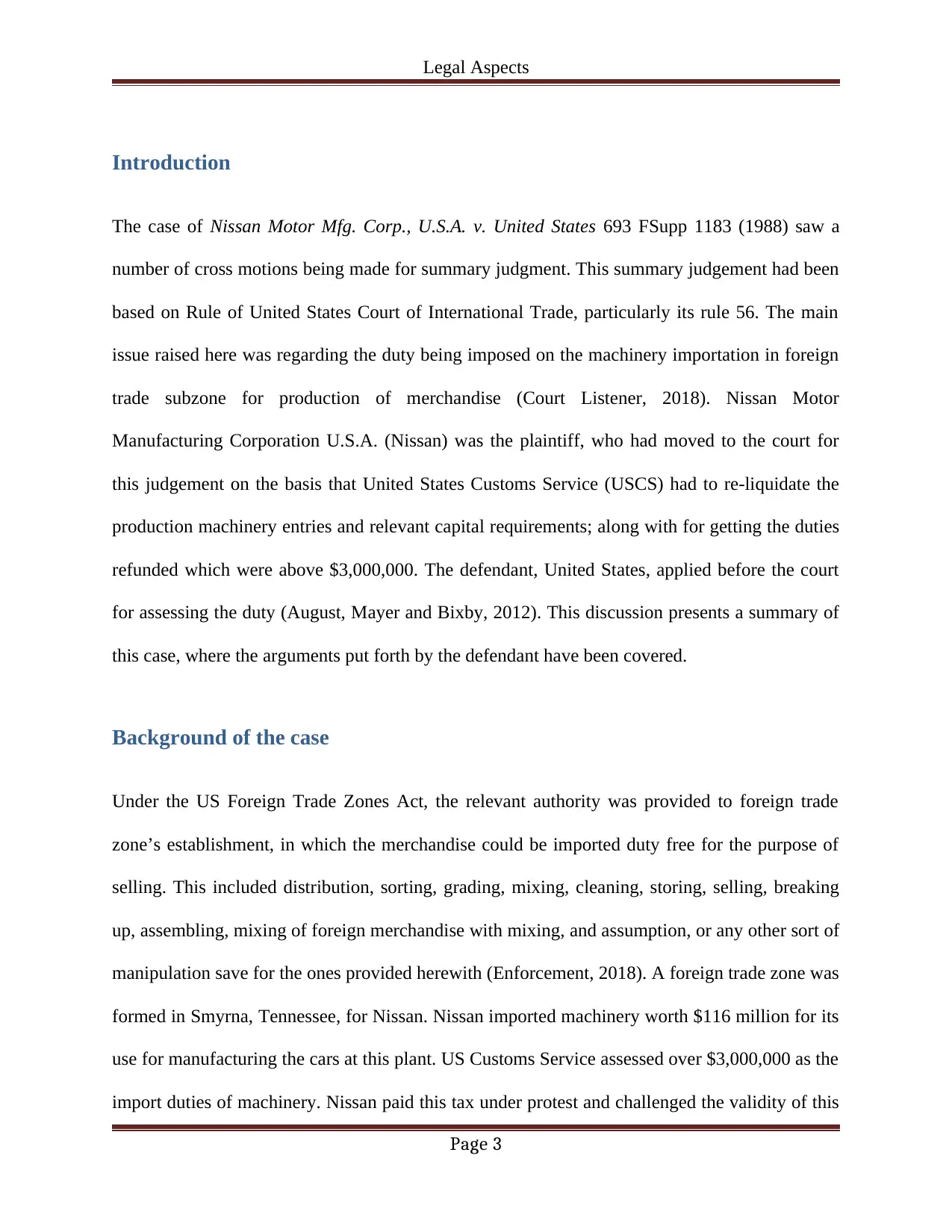
Legal Aspects
Introduction
The case of Nissan Motor Mfg. Corp., U.S.A. v. United States 693 FSupp 1183 (1988) saw a
number of cross motions being made for summary judgment. This summary judgement had been
based on Rule of United States Court of International Trade, particularly its rule 56. The main
issue raised here was regarding the duty being imposed on the machinery importation in foreign
trade subzone for production of merchandise (Court Listener, 2018). Nissan Motor
Manufacturing Corporation U.S.A. (Nissan) was the plaintiff, who had moved to the court for
this judgement on the basis that United States Customs Service (USCS) had to re-liquidate the
production machinery entries and relevant capital requirements; along with for getting the duties
refunded which were above $3,000,000. The defendant, United States, applied before the court
for assessing the duty (August, Mayer and Bixby, 2012). This discussion presents a summary of
this case, where the arguments put forth by the defendant have been covered.
Background of the case
Under the US Foreign Trade Zones Act, the relevant authority was provided to foreign trade
zone’s establishment, in which the merchandise could be imported duty free for the purpose of
selling. This included distribution, sorting, grading, mixing, cleaning, storing, selling, breaking
up, assembling, mixing of foreign merchandise with mixing, and assumption, or any other sort of
manipulation save for the ones provided herewith (Enforcement, 2018). A foreign trade zone was
formed in Smyrna, Tennessee, for Nissan. Nissan imported machinery worth $116 million for its
use for manufacturing the cars at this plant. US Customs Service assessed over $3,000,000 as the
import duties of machinery. Nissan paid this tax under protest and challenged the validity of this
Page 3
Introduction
The case of Nissan Motor Mfg. Corp., U.S.A. v. United States 693 FSupp 1183 (1988) saw a
number of cross motions being made for summary judgment. This summary judgement had been
based on Rule of United States Court of International Trade, particularly its rule 56. The main
issue raised here was regarding the duty being imposed on the machinery importation in foreign
trade subzone for production of merchandise (Court Listener, 2018). Nissan Motor
Manufacturing Corporation U.S.A. (Nissan) was the plaintiff, who had moved to the court for
this judgement on the basis that United States Customs Service (USCS) had to re-liquidate the
production machinery entries and relevant capital requirements; along with for getting the duties
refunded which were above $3,000,000. The defendant, United States, applied before the court
for assessing the duty (August, Mayer and Bixby, 2012). This discussion presents a summary of
this case, where the arguments put forth by the defendant have been covered.
Background of the case
Under the US Foreign Trade Zones Act, the relevant authority was provided to foreign trade
zone’s establishment, in which the merchandise could be imported duty free for the purpose of
selling. This included distribution, sorting, grading, mixing, cleaning, storing, selling, breaking
up, assembling, mixing of foreign merchandise with mixing, and assumption, or any other sort of
manipulation save for the ones provided herewith (Enforcement, 2018). A foreign trade zone was
formed in Smyrna, Tennessee, for Nissan. Nissan imported machinery worth $116 million for its
use for manufacturing the cars at this plant. US Customs Service assessed over $3,000,000 as the
import duties of machinery. Nissan paid this tax under protest and challenged the validity of this
Page 3
⊘ This is a preview!⊘
Do you want full access?
Subscribe today to unlock all pages.

Trusted by 1+ million students worldwide
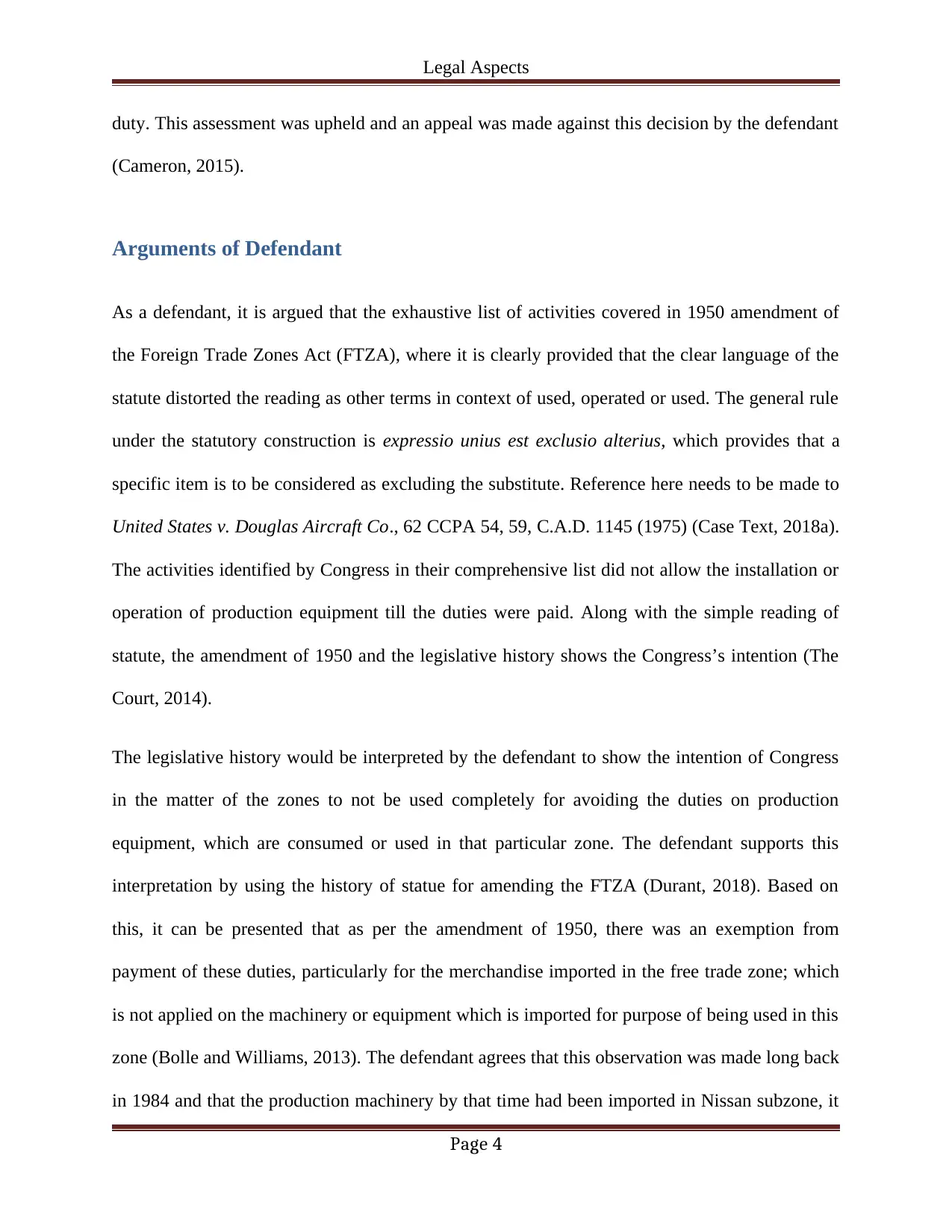
Legal Aspects
duty. This assessment was upheld and an appeal was made against this decision by the defendant
(Cameron, 2015).
Arguments of Defendant
As a defendant, it is argued that the exhaustive list of activities covered in 1950 amendment of
the Foreign Trade Zones Act (FTZA), where it is clearly provided that the clear language of the
statute distorted the reading as other terms in context of used, operated or used. The general rule
under the statutory construction is expressio unius est exclusio alterius, which provides that a
specific item is to be considered as excluding the substitute. Reference here needs to be made to
United States v. Douglas Aircraft Co., 62 CCPA 54, 59, C.A.D. 1145 (1975) (Case Text, 2018a).
The activities identified by Congress in their comprehensive list did not allow the installation or
operation of production equipment till the duties were paid. Along with the simple reading of
statute, the amendment of 1950 and the legislative history shows the Congress’s intention (The
Court, 2014).
The legislative history would be interpreted by the defendant to show the intention of Congress
in the matter of the zones to not be used completely for avoiding the duties on production
equipment, which are consumed or used in that particular zone. The defendant supports this
interpretation by using the history of statue for amending the FTZA (Durant, 2018). Based on
this, it can be presented that as per the amendment of 1950, there was an exemption from
payment of these duties, particularly for the merchandise imported in the free trade zone; which
is not applied on the machinery or equipment which is imported for purpose of being used in this
zone (Bolle and Williams, 2013). The defendant agrees that this observation was made long back
in 1984 and that the production machinery by that time had been imported in Nissan subzone, it
Page 4
duty. This assessment was upheld and an appeal was made against this decision by the defendant
(Cameron, 2015).
Arguments of Defendant
As a defendant, it is argued that the exhaustive list of activities covered in 1950 amendment of
the Foreign Trade Zones Act (FTZA), where it is clearly provided that the clear language of the
statute distorted the reading as other terms in context of used, operated or used. The general rule
under the statutory construction is expressio unius est exclusio alterius, which provides that a
specific item is to be considered as excluding the substitute. Reference here needs to be made to
United States v. Douglas Aircraft Co., 62 CCPA 54, 59, C.A.D. 1145 (1975) (Case Text, 2018a).
The activities identified by Congress in their comprehensive list did not allow the installation or
operation of production equipment till the duties were paid. Along with the simple reading of
statute, the amendment of 1950 and the legislative history shows the Congress’s intention (The
Court, 2014).
The legislative history would be interpreted by the defendant to show the intention of Congress
in the matter of the zones to not be used completely for avoiding the duties on production
equipment, which are consumed or used in that particular zone. The defendant supports this
interpretation by using the history of statue for amending the FTZA (Durant, 2018). Based on
this, it can be presented that as per the amendment of 1950, there was an exemption from
payment of these duties, particularly for the merchandise imported in the free trade zone; which
is not applied on the machinery or equipment which is imported for purpose of being used in this
zone (Bolle and Williams, 2013). The defendant agrees that this observation was made long back
in 1984 and that the production machinery by that time had been imported in Nissan subzone, it
Page 4
Paraphrase This Document
Need a fresh take? Get an instant paraphrase of this document with our AI Paraphraser
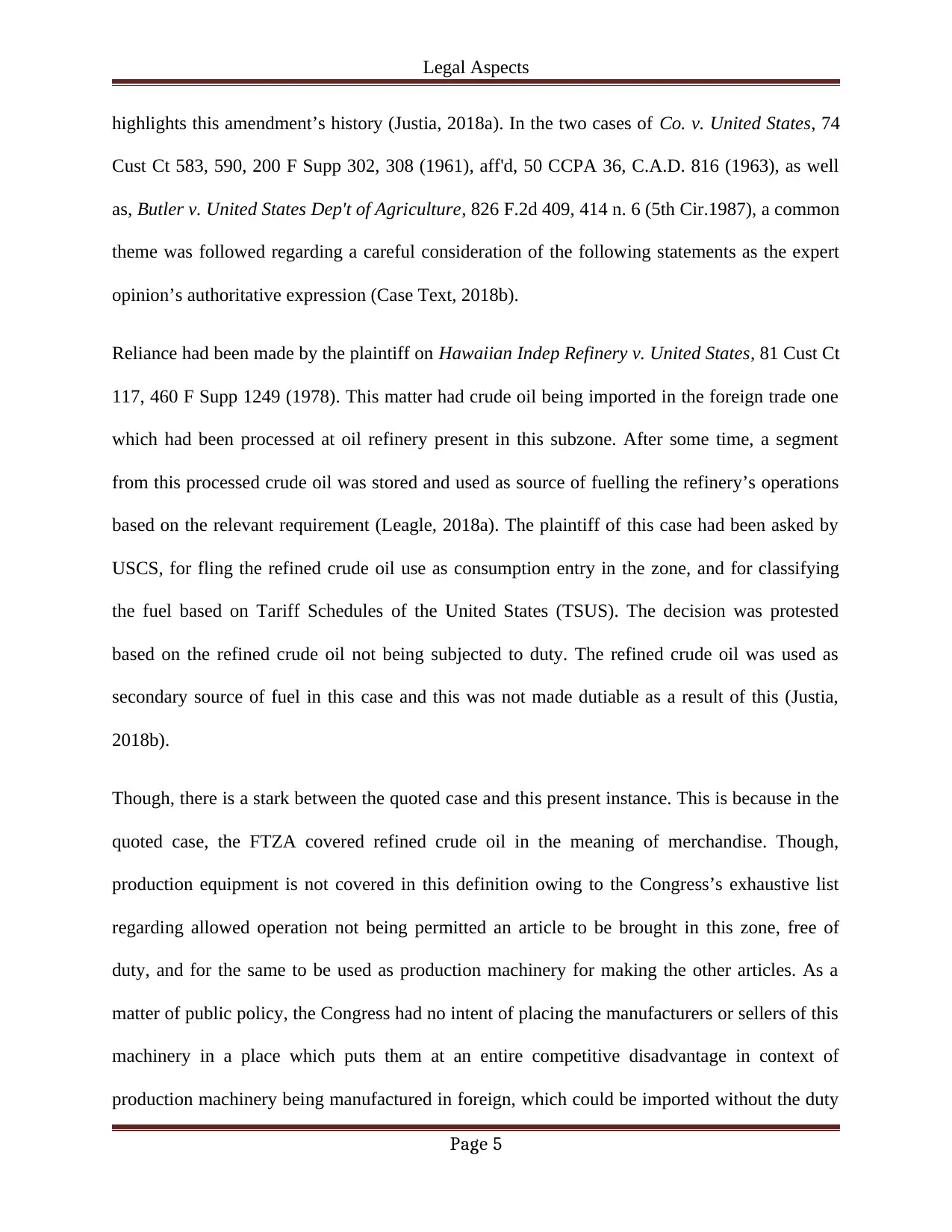
Legal Aspects
highlights this amendment’s history (Justia, 2018a). In the two cases of Co. v. United States, 74
Cust Ct 583, 590, 200 F Supp 302, 308 (1961), aff'd, 50 CCPA 36, C.A.D. 816 (1963), as well
as, Butler v. United States Dep't of Agriculture, 826 F.2d 409, 414 n. 6 (5th Cir.1987), a common
theme was followed regarding a careful consideration of the following statements as the expert
opinion’s authoritative expression (Case Text, 2018b).
Reliance had been made by the plaintiff on Hawaiian Indep Refinery v. United States, 81 Cust Ct
117, 460 F Supp 1249 (1978). This matter had crude oil being imported in the foreign trade one
which had been processed at oil refinery present in this subzone. After some time, a segment
from this processed crude oil was stored and used as source of fuelling the refinery’s operations
based on the relevant requirement (Leagle, 2018a). The plaintiff of this case had been asked by
USCS, for fling the refined crude oil use as consumption entry in the zone, and for classifying
the fuel based on Tariff Schedules of the United States (TSUS). The decision was protested
based on the refined crude oil not being subjected to duty. The refined crude oil was used as
secondary source of fuel in this case and this was not made dutiable as a result of this (Justia,
2018b).
Though, there is a stark between the quoted case and this present instance. This is because in the
quoted case, the FTZA covered refined crude oil in the meaning of merchandise. Though,
production equipment is not covered in this definition owing to the Congress’s exhaustive list
regarding allowed operation not being permitted an article to be brought in this zone, free of
duty, and for the same to be used as production machinery for making the other articles. As a
matter of public policy, the Congress had no intent of placing the manufacturers or sellers of this
machinery in a place which puts them at an entire competitive disadvantage in context of
production machinery being manufactured in foreign, which could be imported without the duty
Page 5
highlights this amendment’s history (Justia, 2018a). In the two cases of Co. v. United States, 74
Cust Ct 583, 590, 200 F Supp 302, 308 (1961), aff'd, 50 CCPA 36, C.A.D. 816 (1963), as well
as, Butler v. United States Dep't of Agriculture, 826 F.2d 409, 414 n. 6 (5th Cir.1987), a common
theme was followed regarding a careful consideration of the following statements as the expert
opinion’s authoritative expression (Case Text, 2018b).
Reliance had been made by the plaintiff on Hawaiian Indep Refinery v. United States, 81 Cust Ct
117, 460 F Supp 1249 (1978). This matter had crude oil being imported in the foreign trade one
which had been processed at oil refinery present in this subzone. After some time, a segment
from this processed crude oil was stored and used as source of fuelling the refinery’s operations
based on the relevant requirement (Leagle, 2018a). The plaintiff of this case had been asked by
USCS, for fling the refined crude oil use as consumption entry in the zone, and for classifying
the fuel based on Tariff Schedules of the United States (TSUS). The decision was protested
based on the refined crude oil not being subjected to duty. The refined crude oil was used as
secondary source of fuel in this case and this was not made dutiable as a result of this (Justia,
2018b).
Though, there is a stark between the quoted case and this present instance. This is because in the
quoted case, the FTZA covered refined crude oil in the meaning of merchandise. Though,
production equipment is not covered in this definition owing to the Congress’s exhaustive list
regarding allowed operation not being permitted an article to be brought in this zone, free of
duty, and for the same to be used as production machinery for making the other articles. As a
matter of public policy, the Congress had no intent of placing the manufacturers or sellers of this
machinery in a place which puts them at an entire competitive disadvantage in context of
production machinery being manufactured in foreign, which could be imported without the duty
Page 5
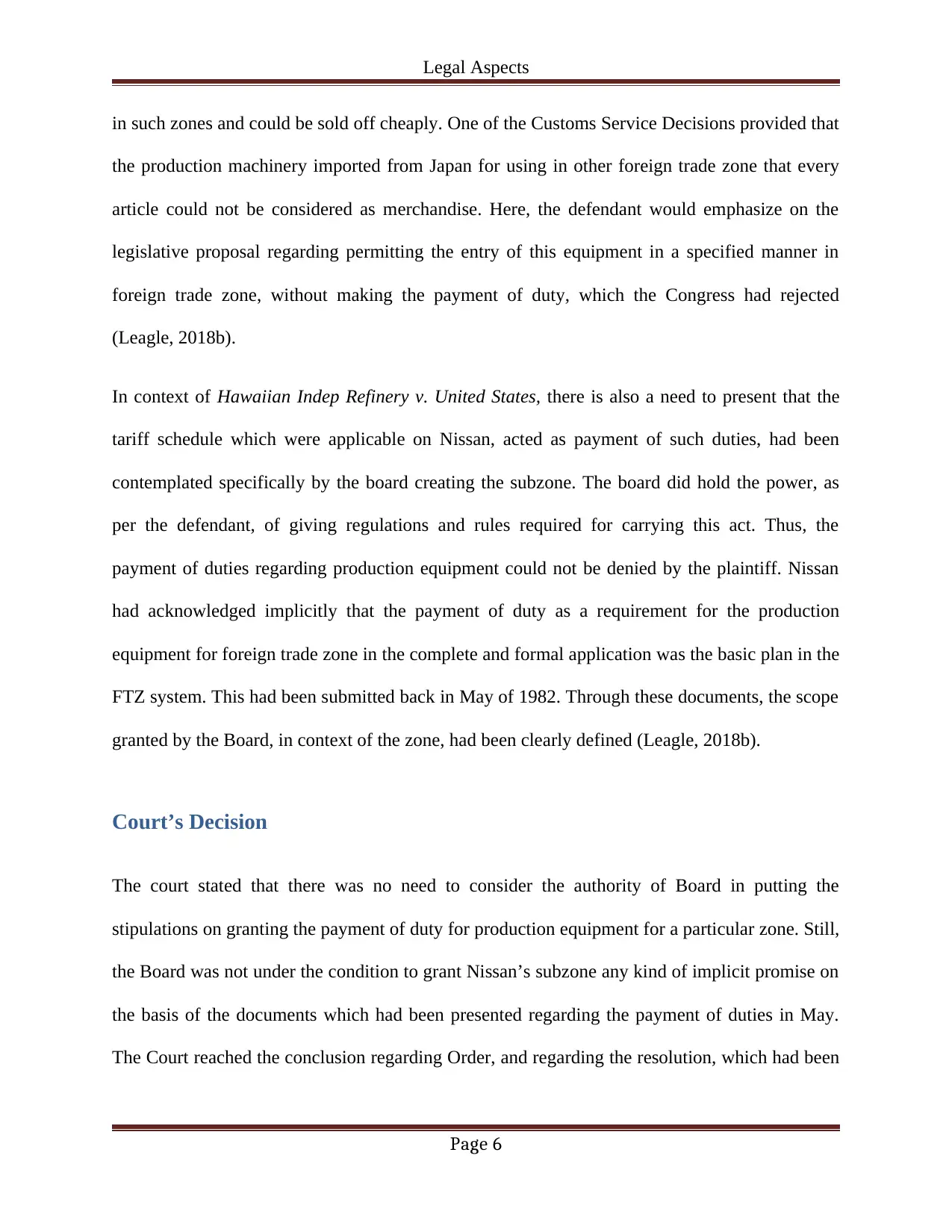
Legal Aspects
in such zones and could be sold off cheaply. One of the Customs Service Decisions provided that
the production machinery imported from Japan for using in other foreign trade zone that every
article could not be considered as merchandise. Here, the defendant would emphasize on the
legislative proposal regarding permitting the entry of this equipment in a specified manner in
foreign trade zone, without making the payment of duty, which the Congress had rejected
(Leagle, 2018b).
In context of Hawaiian Indep Refinery v. United States, there is also a need to present that the
tariff schedule which were applicable on Nissan, acted as payment of such duties, had been
contemplated specifically by the board creating the subzone. The board did hold the power, as
per the defendant, of giving regulations and rules required for carrying this act. Thus, the
payment of duties regarding production equipment could not be denied by the plaintiff. Nissan
had acknowledged implicitly that the payment of duty as a requirement for the production
equipment for foreign trade zone in the complete and formal application was the basic plan in the
FTZ system. This had been submitted back in May of 1982. Through these documents, the scope
granted by the Board, in context of the zone, had been clearly defined (Leagle, 2018b).
Court’s Decision
The court stated that there was no need to consider the authority of Board in putting the
stipulations on granting the payment of duty for production equipment for a particular zone. Still,
the Board was not under the condition to grant Nissan’s subzone any kind of implicit promise on
the basis of the documents which had been presented regarding the payment of duties in May.
The Court reached the conclusion regarding Order, and regarding the resolution, which had been
Page 6
in such zones and could be sold off cheaply. One of the Customs Service Decisions provided that
the production machinery imported from Japan for using in other foreign trade zone that every
article could not be considered as merchandise. Here, the defendant would emphasize on the
legislative proposal regarding permitting the entry of this equipment in a specified manner in
foreign trade zone, without making the payment of duty, which the Congress had rejected
(Leagle, 2018b).
In context of Hawaiian Indep Refinery v. United States, there is also a need to present that the
tariff schedule which were applicable on Nissan, acted as payment of such duties, had been
contemplated specifically by the board creating the subzone. The board did hold the power, as
per the defendant, of giving regulations and rules required for carrying this act. Thus, the
payment of duties regarding production equipment could not be denied by the plaintiff. Nissan
had acknowledged implicitly that the payment of duty as a requirement for the production
equipment for foreign trade zone in the complete and formal application was the basic plan in the
FTZ system. This had been submitted back in May of 1982. Through these documents, the scope
granted by the Board, in context of the zone, had been clearly defined (Leagle, 2018b).
Court’s Decision
The court stated that there was no need to consider the authority of Board in putting the
stipulations on granting the payment of duty for production equipment for a particular zone. Still,
the Board was not under the condition to grant Nissan’s subzone any kind of implicit promise on
the basis of the documents which had been presented regarding the payment of duties in May.
The Court reached the conclusion regarding Order, and regarding the resolution, which had been
Page 6
⊘ This is a preview!⊘
Do you want full access?
Subscribe today to unlock all pages.

Trusted by 1+ million students worldwide
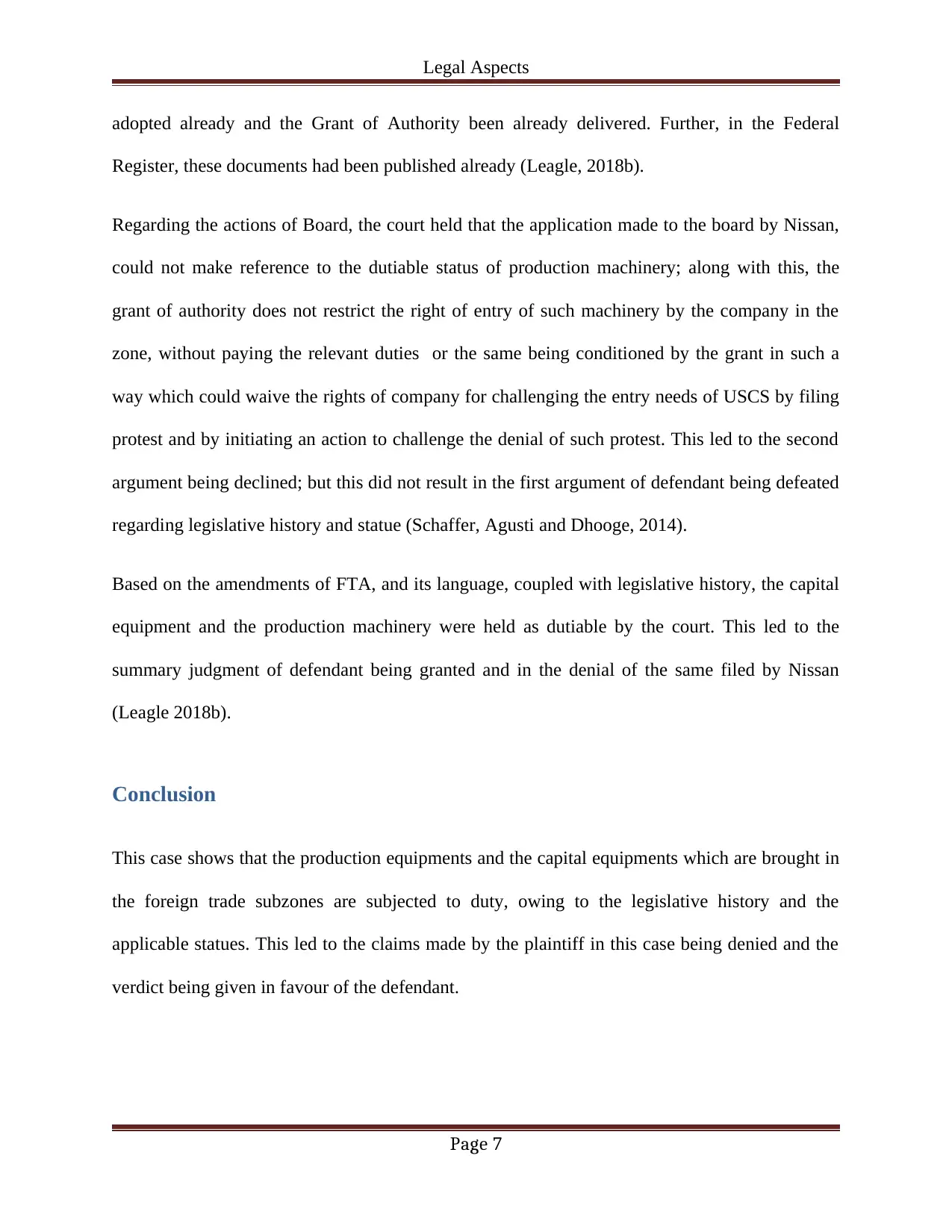
Legal Aspects
adopted already and the Grant of Authority been already delivered. Further, in the Federal
Register, these documents had been published already (Leagle, 2018b).
Regarding the actions of Board, the court held that the application made to the board by Nissan,
could not make reference to the dutiable status of production machinery; along with this, the
grant of authority does not restrict the right of entry of such machinery by the company in the
zone, without paying the relevant duties or the same being conditioned by the grant in such a
way which could waive the rights of company for challenging the entry needs of USCS by filing
protest and by initiating an action to challenge the denial of such protest. This led to the second
argument being declined; but this did not result in the first argument of defendant being defeated
regarding legislative history and statue (Schaffer, Agusti and Dhooge, 2014).
Based on the amendments of FTA, and its language, coupled with legislative history, the capital
equipment and the production machinery were held as dutiable by the court. This led to the
summary judgment of defendant being granted and in the denial of the same filed by Nissan
(Leagle 2018b).
Conclusion
This case shows that the production equipments and the capital equipments which are brought in
the foreign trade subzones are subjected to duty, owing to the legislative history and the
applicable statues. This led to the claims made by the plaintiff in this case being denied and the
verdict being given in favour of the defendant.
Page 7
adopted already and the Grant of Authority been already delivered. Further, in the Federal
Register, these documents had been published already (Leagle, 2018b).
Regarding the actions of Board, the court held that the application made to the board by Nissan,
could not make reference to the dutiable status of production machinery; along with this, the
grant of authority does not restrict the right of entry of such machinery by the company in the
zone, without paying the relevant duties or the same being conditioned by the grant in such a
way which could waive the rights of company for challenging the entry needs of USCS by filing
protest and by initiating an action to challenge the denial of such protest. This led to the second
argument being declined; but this did not result in the first argument of defendant being defeated
regarding legislative history and statue (Schaffer, Agusti and Dhooge, 2014).
Based on the amendments of FTA, and its language, coupled with legislative history, the capital
equipment and the production machinery were held as dutiable by the court. This led to the
summary judgment of defendant being granted and in the denial of the same filed by Nissan
(Leagle 2018b).
Conclusion
This case shows that the production equipments and the capital equipments which are brought in
the foreign trade subzones are subjected to duty, owing to the legislative history and the
applicable statues. This led to the claims made by the plaintiff in this case being denied and the
verdict being given in favour of the defendant.
Page 7
Paraphrase This Document
Need a fresh take? Get an instant paraphrase of this document with our AI Paraphraser
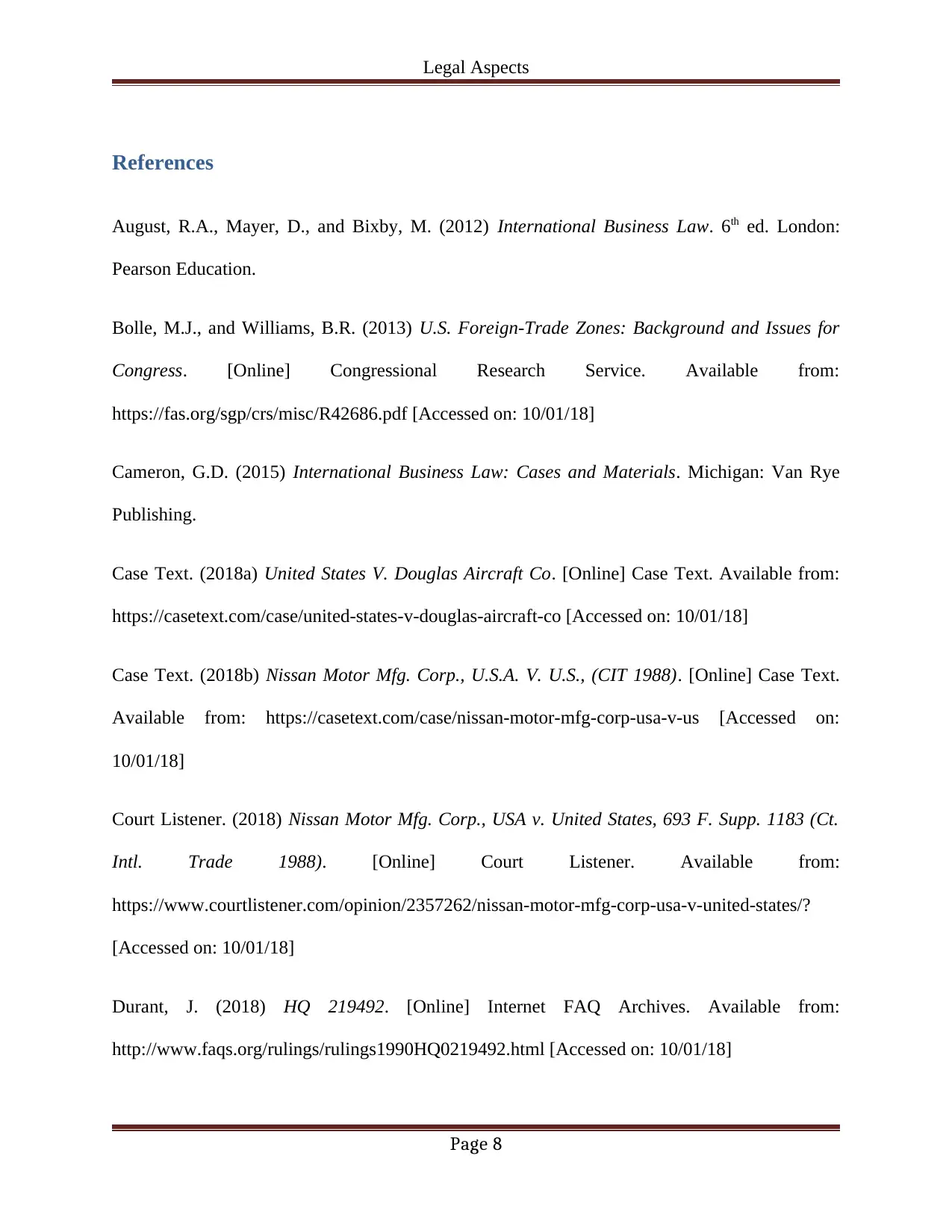
Legal Aspects
References
August, R.A., Mayer, D., and Bixby, M. (2012) International Business Law. 6th ed. London:
Pearson Education.
Bolle, M.J., and Williams, B.R. (2013) U.S. Foreign-Trade Zones: Background and Issues for
Congress. [Online] Congressional Research Service. Available from:
https://fas.org/sgp/crs/misc/R42686.pdf [Accessed on: 10/01/18]
Cameron, G.D. (2015) International Business Law: Cases and Materials. Michigan: Van Rye
Publishing.
Case Text. (2018a) United States V. Douglas Aircraft Co. [Online] Case Text. Available from:
https://casetext.com/case/united-states-v-douglas-aircraft-co [Accessed on: 10/01/18]
Case Text. (2018b) Nissan Motor Mfg. Corp., U.S.A. V. U.S., (CIT 1988). [Online] Case Text.
Available from: https://casetext.com/case/nissan-motor-mfg-corp-usa-v-us [Accessed on:
10/01/18]
Court Listener. (2018) Nissan Motor Mfg. Corp., USA v. United States, 693 F. Supp. 1183 (Ct.
Intl. Trade 1988). [Online] Court Listener. Available from:
https://www.courtlistener.com/opinion/2357262/nissan-motor-mfg-corp-usa-v-united-states/?
[Accessed on: 10/01/18]
Durant, J. (2018) HQ 219492. [Online] Internet FAQ Archives. Available from:
http://www.faqs.org/rulings/rulings1990HQ0219492.html [Accessed on: 10/01/18]
Page 8
References
August, R.A., Mayer, D., and Bixby, M. (2012) International Business Law. 6th ed. London:
Pearson Education.
Bolle, M.J., and Williams, B.R. (2013) U.S. Foreign-Trade Zones: Background and Issues for
Congress. [Online] Congressional Research Service. Available from:
https://fas.org/sgp/crs/misc/R42686.pdf [Accessed on: 10/01/18]
Cameron, G.D. (2015) International Business Law: Cases and Materials. Michigan: Van Rye
Publishing.
Case Text. (2018a) United States V. Douglas Aircraft Co. [Online] Case Text. Available from:
https://casetext.com/case/united-states-v-douglas-aircraft-co [Accessed on: 10/01/18]
Case Text. (2018b) Nissan Motor Mfg. Corp., U.S.A. V. U.S., (CIT 1988). [Online] Case Text.
Available from: https://casetext.com/case/nissan-motor-mfg-corp-usa-v-us [Accessed on:
10/01/18]
Court Listener. (2018) Nissan Motor Mfg. Corp., USA v. United States, 693 F. Supp. 1183 (Ct.
Intl. Trade 1988). [Online] Court Listener. Available from:
https://www.courtlistener.com/opinion/2357262/nissan-motor-mfg-corp-usa-v-united-states/?
[Accessed on: 10/01/18]
Durant, J. (2018) HQ 219492. [Online] Internet FAQ Archives. Available from:
http://www.faqs.org/rulings/rulings1990HQ0219492.html [Accessed on: 10/01/18]
Page 8
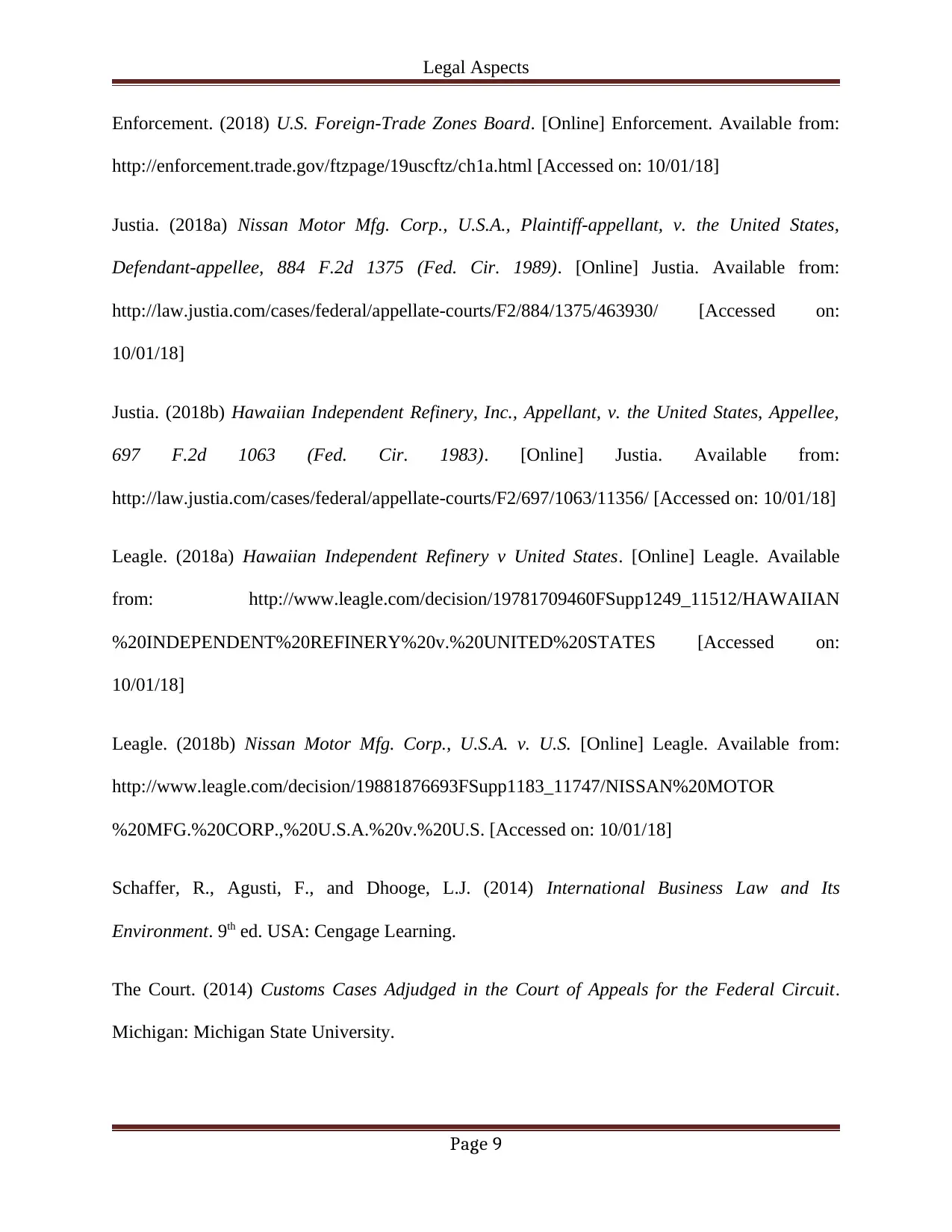
Legal Aspects
Enforcement. (2018) U.S. Foreign-Trade Zones Board. [Online] Enforcement. Available from:
http://enforcement.trade.gov/ftzpage/19uscftz/ch1a.html [Accessed on: 10/01/18]
Justia. (2018a) Nissan Motor Mfg. Corp., U.S.A., Plaintiff-appellant, v. the United States,
Defendant-appellee, 884 F.2d 1375 (Fed. Cir. 1989). [Online] Justia. Available from:
http://law.justia.com/cases/federal/appellate-courts/F2/884/1375/463930/ [Accessed on:
10/01/18]
Justia. (2018b) Hawaiian Independent Refinery, Inc., Appellant, v. the United States, Appellee,
697 F.2d 1063 (Fed. Cir. 1983). [Online] Justia. Available from:
http://law.justia.com/cases/federal/appellate-courts/F2/697/1063/11356/ [Accessed on: 10/01/18]
Leagle. (2018a) Hawaiian Independent Refinery v United States. [Online] Leagle. Available
from: http://www.leagle.com/decision/19781709460FSupp1249_11512/HAWAIIAN
%20INDEPENDENT%20REFINERY%20v.%20UNITED%20STATES [Accessed on:
10/01/18]
Leagle. (2018b) Nissan Motor Mfg. Corp., U.S.A. v. U.S. [Online] Leagle. Available from:
http://www.leagle.com/decision/19881876693FSupp1183_11747/NISSAN%20MOTOR
%20MFG.%20CORP.,%20U.S.A.%20v.%20U.S. [Accessed on: 10/01/18]
Schaffer, R., Agusti, F., and Dhooge, L.J. (2014) International Business Law and Its
Environment. 9th ed. USA: Cengage Learning.
The Court. (2014) Customs Cases Adjudged in the Court of Appeals for the Federal Circuit.
Michigan: Michigan State University.
Page 9
Enforcement. (2018) U.S. Foreign-Trade Zones Board. [Online] Enforcement. Available from:
http://enforcement.trade.gov/ftzpage/19uscftz/ch1a.html [Accessed on: 10/01/18]
Justia. (2018a) Nissan Motor Mfg. Corp., U.S.A., Plaintiff-appellant, v. the United States,
Defendant-appellee, 884 F.2d 1375 (Fed. Cir. 1989). [Online] Justia. Available from:
http://law.justia.com/cases/federal/appellate-courts/F2/884/1375/463930/ [Accessed on:
10/01/18]
Justia. (2018b) Hawaiian Independent Refinery, Inc., Appellant, v. the United States, Appellee,
697 F.2d 1063 (Fed. Cir. 1983). [Online] Justia. Available from:
http://law.justia.com/cases/federal/appellate-courts/F2/697/1063/11356/ [Accessed on: 10/01/18]
Leagle. (2018a) Hawaiian Independent Refinery v United States. [Online] Leagle. Available
from: http://www.leagle.com/decision/19781709460FSupp1249_11512/HAWAIIAN
%20INDEPENDENT%20REFINERY%20v.%20UNITED%20STATES [Accessed on:
10/01/18]
Leagle. (2018b) Nissan Motor Mfg. Corp., U.S.A. v. U.S. [Online] Leagle. Available from:
http://www.leagle.com/decision/19881876693FSupp1183_11747/NISSAN%20MOTOR
%20MFG.%20CORP.,%20U.S.A.%20v.%20U.S. [Accessed on: 10/01/18]
Schaffer, R., Agusti, F., and Dhooge, L.J. (2014) International Business Law and Its
Environment. 9th ed. USA: Cengage Learning.
The Court. (2014) Customs Cases Adjudged in the Court of Appeals for the Federal Circuit.
Michigan: Michigan State University.
Page 9
⊘ This is a preview!⊘
Do you want full access?
Subscribe today to unlock all pages.

Trusted by 1+ million students worldwide
1 out of 9
Your All-in-One AI-Powered Toolkit for Academic Success.
+13062052269
info@desklib.com
Available 24*7 on WhatsApp / Email
![[object Object]](/_next/static/media/star-bottom.7253800d.svg)
Unlock your academic potential
Copyright © 2020–2026 A2Z Services. All Rights Reserved. Developed and managed by ZUCOL.

